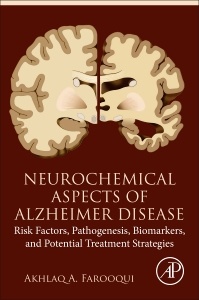Neurochemical Aspects of Alzheimer's Disease Risk Factors, Pathogenesis, Biomarkers, and Potential Treatment Strategies
Auteur : Farooqui Akhlaq A.

Neurochemical Aspects of Alzheimer's Disease provides a comprehensive overview of molecular aspects of risk factors, pathogenesis, biomarkers, and therapeutic strategies. The book focuses on molecular mechanisms and signal transduction processes associated with the pathogenesis, biomarkers, and therapeutic strategies of AD. The comprehensive and cutting edge information in this monograph may not only help in early detection of AD, but also promote discovery of new drugs to treat this chronic disease. Chapters discuss involvement of neural membrane phospholipids, sphingolipids, and cholesterol-derived lipid mediators, abnormal APP processing, and nucleic acid damage, risk factors, biomarker, and therapeutic strategies of Alzheimer's disease. This book is written for neurologists, neuroscientists, neurochemists, neuropharmacologists, and clinicianswho are interested in molecular mechanisms associated with the pathogenesis of age-related neurological disorders.
1. Neurochemical Aspects of ß-Amyloid Cascade Hypothesis for Alzheimer's Disease: A Critical Evaluation2. Risk Factors for Alzheimer's Disease3. Contribution of Neural Membrane Phospholipids (Sphingolipids) and Cholesterol in the Pathogenesis of Alzheimer's Disease4. Contribution of Nucleic Acids in the Pathogenesis of Alzheimer's Disease5. Type 2 Diabetes and Metabolic Syndrome as Risk Factors for Alzheimer's Disease6. Contribution of Neuroinflammation in the Pathogenesis of Alzheimer's Disease 7. Biomarkers for Alzheimer's Disease8. Potential Treatments for Alzheimer's Disease9. Immunotherapy for the Treatment of Alzheimer's Disease10. Perspective, Summary, and Directions for Future Research on Alzheimer's Disease
researchers, clinical practitioners, and advanced graduate students in clinical neuroscience, neurology, neurochemistry, and neuropharmacology
- Provides a comprehensive overview of molecular aspects of risk factors, pathogenesis, biomarkers, and therapeutic strategies for Alzheimer's disease
- Written for researchers, clinicians, and advanced graduate students in neurology, neuroscience, neurochemistry, and neuropharmacology
- Acts as the first book to provide a comprehensive description of the signal transduction processes associated with pathogenesis of Alzheimer's disease
Date de parution : 05-2017
Ouvrage de 414 p.
15x22.8 cm
Thème de Neurochemical Aspects of Alzheimer's Disease :
Mots-clés :
�-Amyloid; γ-Secretase modulator; Acetylcholinesterase; Alzheimer disease; Amyloid-�Amyloid precursor protein; Astrocyte; Bapineuzumab; Blood�brain barrier; Cerebrospinal fluid; Cholesterol; Dementia; FDG; Fibrillar A�Neurodegeneration; Glycerophospholipid; Hyperinsulinemia; Hyperphosphorylated Tau; Hyperphosphorylated; Interleukin; Lipid raft; Memantine; Metabolic syndrome; Microglial cells; MicroRNA; Mitochondrial DNA; Monoclonal antibodies; Neurofibrillary tangles; Neuroinflammation; Neuronflammation; Nitric oxide synthase; Oxidative stress; Peroxynitrile; Phospholipase A2; Phospholipid; Presenilin; Proinflammatory; Rapamycin; Reactive oxygen species; Senile plaques; Solanezumab; Sphingolipid; Sphingomyelin; Sporadic AD; Synaptic stripping; Tau protein; Traumatic brain injury; Tumor necrosis factor; Type II diabetes; Western diet



